
From the economy to foreign affairs to the way they carried themselves on stage, Senators John McCain and Barack Obama offered a dramatic contrast to the nation in their first presidential debate on Friday night, mixing disdain and often caustic remarks as they set out sharply different views of how they would manage the country and confront America’s adversaries abroad.
The two men met for 90 minutes against the backdrop of the nation’s worst financial crisis since the Great Depression and intensive negotiations in Congress over a $700 billion bailout plan for Wall Street.
Despite repeated prodding, Mr. McCain and Mr. Obama refused to point to any major adjustments they would need to make to their governing agendas — like scaling back promised tax reductions or spending programs — to accommodate what both men said could be very tough economic times for the next president.
For the first 40 minutes, Mr. Obama repeatedly sought to link Mr. McCain to President Bush, and suggested that it was policies of excessive deregulation that led to the financial crisis and mounting economic problems the nation faces now.
"We also have to recognize that this is a final verdict on eight years of failed economic policies promoted by George Bush, supported by Senator McCain — the theory that basically says that we can shred regulations and consumer protections and give more and more to the most and somehow prosperity will trickle down,” Mr. Obama said. “It hasn’t worked and I think that the fundamentals of the economy have to be measured by whether or not the middle class is getting a fair shake.”
Mr. McCain became more animated during the second part of the debate, when it shifted to the advertised topic: foreign policy and national security. The two men offered strong and fundamentally different arguments about the wisdom of going to war against Iraq — which Mr. McCain supported and Mr. Obama opposed — as well as how to deal with Iran.
More than anything, Mr. McCain seemed intent on presenting Mr. Obama as green and inexperienced, a risky choice during a difficult time. Again and again, sounding almost like a professor talking down to a new student, he talked about having to explain foreign policy to Mr. Obama and repeatedly invoked his 30 years of history on national security (even though Mr. McCain, in the kind of misstep that no doubt would have been used by Republicans against Mr. Obama, mangled the name of the Iranian president, Mahmoud Ahmadinejad, and he stumbled over the name of Pakistan’s newly inaugurated president, calling him “Qadari.” His name is actually Asif Ali Zardari.).
“I don’t think I need any on-the-job training,” Mr. McCain said in the closing moments of the debate. “I’m ready to go at it right now.”
But Mr. Obama seemed calm and in control and seemed to hold his own on foreign policy, the subject on which Mr. McCain was assumed to hold a natural advantage. Mr. Obama talked in detail about foreign countries and their leaders, as if trying to assure the audience that he could hold his own on the world stage. He raised his own questions about Mr. McCain’s judgment in supporting the Iraq war.
“You like to pretend like the war started in 2007 — you talk about the surge. The war started in 2003,” Mr. Obama said. “At the time, when the war started, you said it was going to be quick and easy. You said we knew where the weapons of mass destruction were. You were wrong. You said that we were going to be greeted as liberators. You were wrong.”
There were no obvious game-changing moments — big mistakes, or the kind of sound bites that dominate the news for days — in the course of the 90-minute debate, held at the University of Mississippi in Oxford. Still, the debate served as a reminder of just how different these two men would be as president as they appeared for their first extended session together before a huge audience, including many Americans who are just beginning to focus on this long-lasting race.
The differences were in no small part stylistic and visible with a glance to the stage: a youthful 47-year-old young black man who has been in the Senate for three years standing on one lectern, facing a 71-year old white-haired fixture of the Senate standing across from him. In many ways, Mr. Obama was a very different candidate than he was during the primary battles. He answered questions directly and affirmatively, typically looking right into the camera as he spoke.
Throughout the debate, Mr. Obama called Mr. McCain by his first name; Mr. McCain did not. The direct engagement was encouraged by the moderator, Jim Lehrer of PBS, who declared, “I’m just determined to get you all to talk to each other,” though it was an invitation that the two men repeatedly ignored.
Mr. McCain was feisty and aggressive but, particularly during the start of the debate, his language and demeanor offered a reminder of just how much he was a creature of the United States Senate, as he used phrases that were no doubt understandable in Washington but might have been lost to the audience at home. He spent much of the first 20 minutes of the debate criticizing Mr. Obama for supporting earmarks, special projects sought by members for their district. “The United States Senate will take up a continuing resolution tomorrow or the next day — sometime next week — with 2,000 — 2,000 — look at them, my friends,” he said. “Look at ’em. You’ll be appalled. And Senator Obama is a recent convert, after requesting $932 million worth of pork-barrel spending projects.
On Iraq, both candidates used the stories of fallen soldiers to support their own positions on the war. Mr. McCain told the audience about a New Hampshire woman who presented him with a bracelet of her 22-year-old son who was killed in combat. She asked him to keep alive the mission so his death was not in vain.“I will wear his bracelet with honor,” Mr. McCain recalled, raising his right hand to show the bracelet that still remains on his arm.
The moment he finished, Mr. Obama said, “I’ve got a bracelet, too.” He told the story of a Wisconsin woman who presented him with a token from her son who was killed in the war. She asked Mr. Obama to end the war so other mothers do not share her anguish.
If Mr. Obama came into the debate seeking to link the economic crisis to Mr. McCain and to Mr. Bush, Mr. McCain sought to portray his rival as a naïve interloper; he barely looked at him all night, and seven times used a variation of the phrase that Mr. Obama “doesn’t understand.”
“I’m afraid Senator Obama doesn’t understand” and “What Senator Obama doesn’t seem to understand” and “Senator Obama still doesn’t understand” were Mr. McCain’s constant refrains, delivered with a frozen smile and a hint of condescension.
“A little bit of naïvete there,” Mr. McCain said after Mr. Obama’s remarks on a question about the American-Russian relationship.
The two men were somewhat wary of the debate’s unusual format — each had two minutes to answer a question, and then five minutes for free-flowing and perhaps unpredictable debate. During the first question, they generally kept outlining their policy views rather than engaging directly.
“Ten days ago, John said the fundamentals of the economy are strong—” Mr. Obama started.
“Say it directly to him,” said Mr. Lehrer, the moderator.
“John, you said 10 days ago the fundamentals of the economy are strong — —” Mr. Obama said to laughter.
“Are you afraid I couldn’t hear him?” Mr. McCain said to Mr. Lehrer, to more laughter.
The differences between the two men included taxes, Iraq and the Iran. When Mr. McCain was asked how he would deal with the economic crisis, he talked about curbing government spending, especially what he said was $18 billion in spending on the pet projects known as earmarks.
“The first thing we have to do is get spending under control in Washington. It’s completely out of control,” he said, and assailed Mr. Obama for requesting $932 million in earmark spending as a senator.
“That kind of thing is not the way to rein in runaway spending in Washington, D.C.,” he said ”That’s one of the fundamental differences that Senator Obama and I have.”
Mr. Obama responded by assailing Mr. McCain’s call for tax cuts for the wealthy. “Let’s be clear: earmarks account for $18 billion in last year’s budget. Senator McCain is proposing -- and this is a fundamental difference between us — $300 billion in tax cuts to some of the wealthiest corporations and individuals in the country, $300 billion. Now, $18 billion is important; $300 billion is really important.”
Turning to Mr. McCain, he said: “John, it’s been your president who you said you agreed with 90 percent of the time who presided over this increase in spending, this orgy of spending and enormous deficits and you voted for almost all of his budgets.”
Mr. McCain accused Mr. Obama of having “the most liberal voting record in the United States Senate.” He chuckled aloud, adding: “It’s hard to reach across the aisle from that far to the left.”
A few moments later, Mr. Obama responded: “John mentioned me being wildly liberal. Mostly, that’s just me opposing George Bush’s wrongheaded policies since I’ve been in Congress.”
The New York Times
http://www.nytimes.com/2008/09/27/us/politics/27debatecnd.html?hp
Crisis financiera y política exterior dominaron el debate
Mientras Obama se refería a su oponente como John; McCain lo trató con distancia
Oxford. EEUU.- El nominado demócrata a la Casa Blanca, Barack Obama, y su rival republicano, John McCain, centraron su primer debate televisivo en la crisis financiera que enfrenta Estados Unidos y en la política exterior, donde coincidieron en que Rusia e Irán suponen una amenaza para la paz y sus vecinos; aunque adoptaron posturas distintas, señaló AFP.
En un debate pactado a 90 minutos, con tiempos de respuestas de dos minutos, los dos candidatos comenzaron, como era previsible, por el tema que más preocupa hoy a los estadounidenses: la profunda crisis.
El senador demócrata por Illinois (norte), que en todo momento presentó a su rival como un continuador del impopular presidente republicano George W. Bush, afirmó que la actual crisis es "el corolario de ocho años de fracasadas políticas económicas apoyadas por el senador McCain", indicó Reuters.
El senador republicano por Arizona (sur) sostuvo por su parte que emitió varias advertencias sobre la crisis. "Muchos de nosotros vimos llegar este tren", enfatizó.
Durante las intervenciones McCain se refirió a su oponente con distancia y en varias oportunidades aseguró: "El senador Obama no entiende"; mientras que el candidato demócrata se mostró más cercano a su rival y aseguró repetidas veces que "John tiene la razón".
McCain, de 72 años, afirmó que no está dispuesto a amenazar a Pakistán con retirar la ayuda bilateral. "Tenemos que ayudar a la gente de Pakistán" para lograr su colaboración. Defendió la estrategia norteamericana en Irak que implicó un aumento de tropas propuesto por él. Estados Unidos está "ganando en Irak", dijo. El "aumento" de tropas "fue un éxito".
Obama, por otro lado, defendió su derecho a sentarse a negociar con líderes de países hostiles como Irán, Venezuela o Cuba y dijo que la estrategia de no dialogar ha resultado un fracaso.
El senador por Illinois reprochó a McCain que dijera en una entrevista hace unos días que no sabe si se reuniría con el presidente de España, Jose Luis Rodríguez Zapatero.
Contraataque inmediato
Tan sólo unos minutos después de concluir el debate, la campaña de McCain contraatacó con un video con las concesiones que le hizo Barack Obama, mientras que los demócratas pusieron en evidencia las contradicciones del republicano en el cara a cara, reportó Efe. Se remitió un video a los medios, que fue puesto en Youtube, en el que se reproducen las tres ocasiones en que Obama le da la razón a McCain.
Los primeros resultados de una encuesta realizada a 500 personas declaradas como votantes indecisos han dado como ganador al candidato demócrata, Barack Obama, después del primer cara a cara que sostuvo con el aspirante republicano John McCain en la Universidad de Mississippi. 40% de ellos, según una encuesta elaborada por la cadena CBS, percibió a Obama como ganador mientras que 22% dio la victoria al candidato republicano y el 8% consideró que hubo empate.
El Universal
http://www.eluniversal.com/2008/09/27/int_art_crisis--financiera-y_1065648.shtml
Detienen al inspector de la Aviación por "conspirar"
Comisión de la AN difundió grabación que involucra a Vinicio De Sola
La comisión especial de la Asamblea Nacional que investiga la presunta conspiración en contra del presidente Hugo Chávez hizo pública una grabación que involucra al empresario fallecido Vinicio De Sola en un plan para generar pronunciamientos de militares venezolanos en rechazo al Gobierno nacional."Hay una grabación de este señor (Vinicio De Sola) donde está trabajando para producir un pronunciamiento escalonado de militares de alto rango de la Fuerza Armada", reveló el diputado Mario Isea en una rueda de prensa realizada ayer.
Después de reproducir la grabación, el parlamentario explicó que De Sola trataba de reclutar oficiales de alto rango de los cuatro componentes de las Fuerzas Armadas para poner en marcha un "Altamira II".
Manifestó que la grabación confirma las sospechas de la Comisión de que la supuesta conspiración "es un proceso continuo" en el que participan quienes estuvieron involucrados en los hechos de abril de 2002.
"De Sola señala ahí que él montó todo para el 11 de abril y habla de una reunión en la casa de Miguel Henrique Otero a la cual asistió todo el mundo, incluyendo al Clero", destacó.
Para Isea la conversación del difunto es prueba de que el complot es parte de un proyecto complejo que involucra la creación de varios escenarios de desestabilización política.
"Hemos dicho que una vertiente del plan va más allá del F16, del cañón lanzacohetes, del T4, que podría generar un punto de división que tenga efecto exterior y un efecto en los sectores civiles", comentó.
Precisó que han recibido mucha información sobre el caso a través del correo electrónico noalgolpe@gmail.com, el cual fue dispuesto por la comisión que preside para recabar y procesar aquellos datos que tenga la ciudadanía sobre el plan conspirativo.
El legislador también anunció la reciente detención del Inspector General de la Aviación, general de división (AVB) José Félix Caraballo Gómez por ser uno de los presuntos contactos de De Sola dentro de las FANB.
Aunque no dio detalles acerca de cuándo fue detenido el militar activo o en dónde se encontraba, indicó que la instancia militar correspondiente brindaría información en el momento apropiado. Aseveró que la comisión seguirá recabando datos que prueben la culpabilidad de los supuestos conspiradores, para que la justicia venezolana pueda actuar. "Tengan la seguridad de que aquí va a haber sanciones", afirmó.
Nota:
Vinicio de Sola, uno de los mencionados en el faso complot, falleció el 12SE2008. ¿Cómo puede un muerto consoirar?
Pandora
El Universal
http://politica.eluniversal.com/2008/09/27/pol_art_detienen-al-inspecto_1065522.shtml








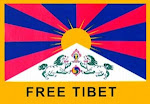
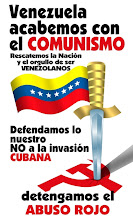






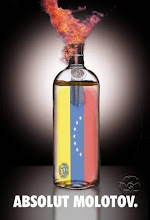
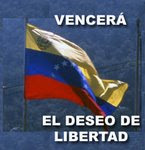
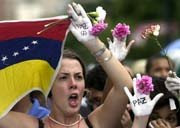



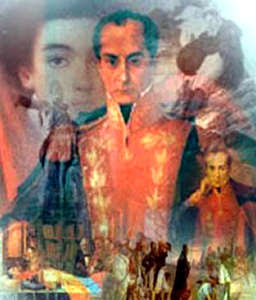
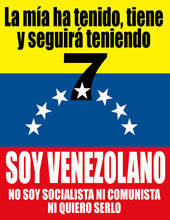
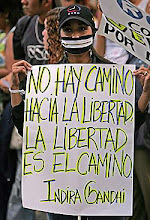




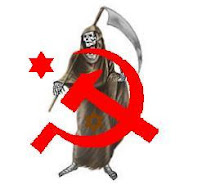

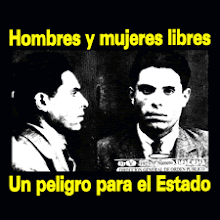
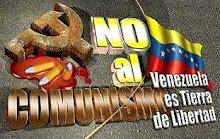

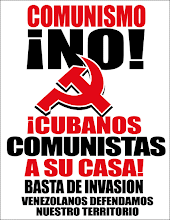


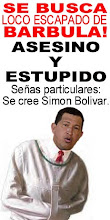
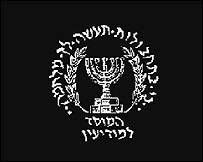

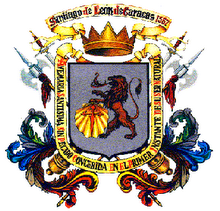


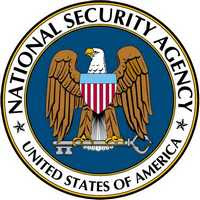


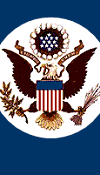
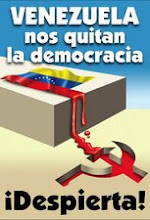



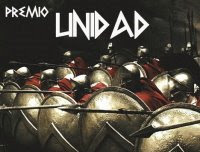




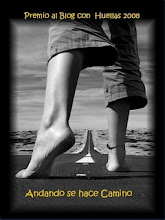
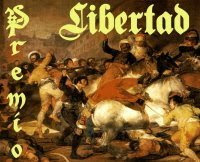



















No hay comentarios:
Publicar un comentario